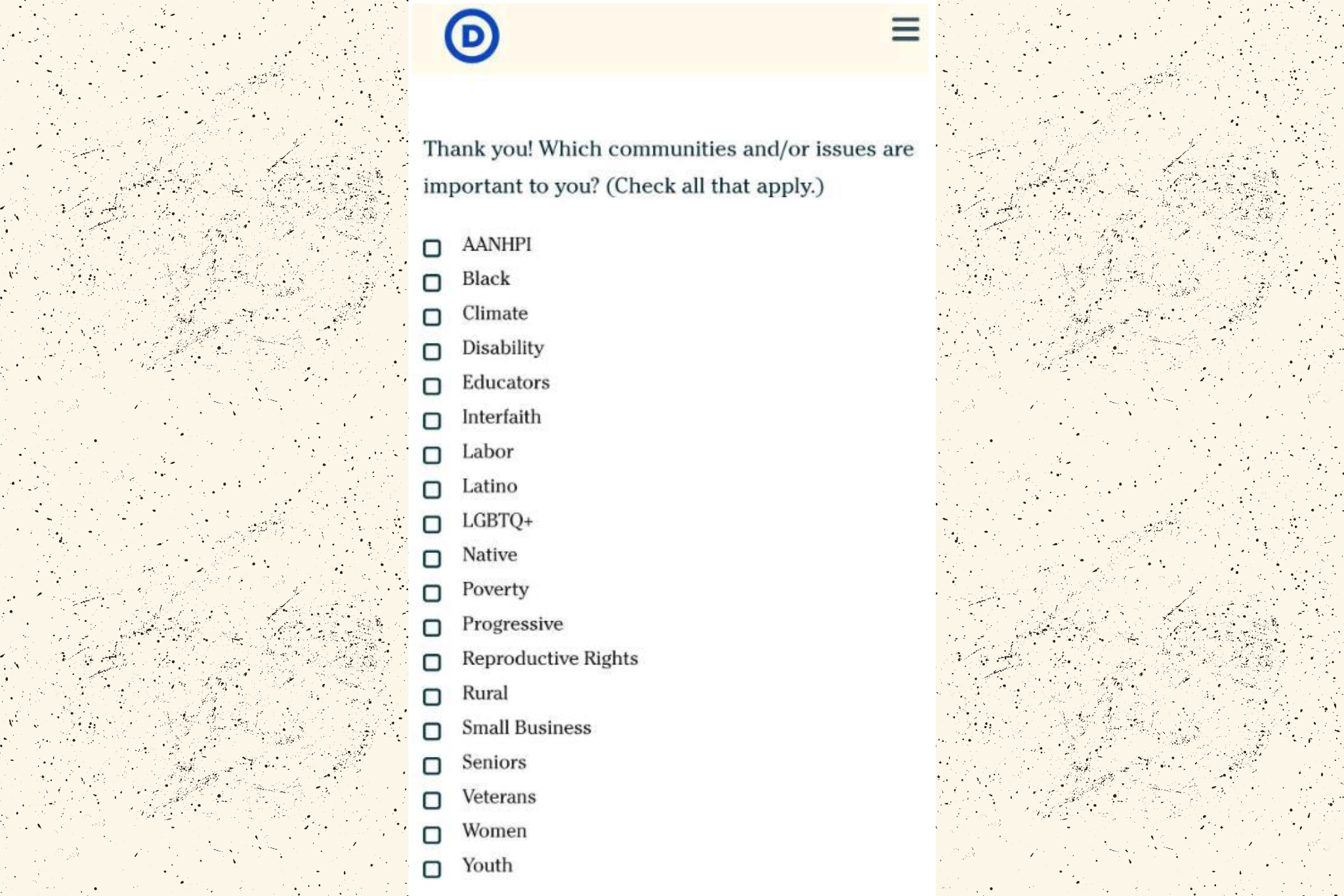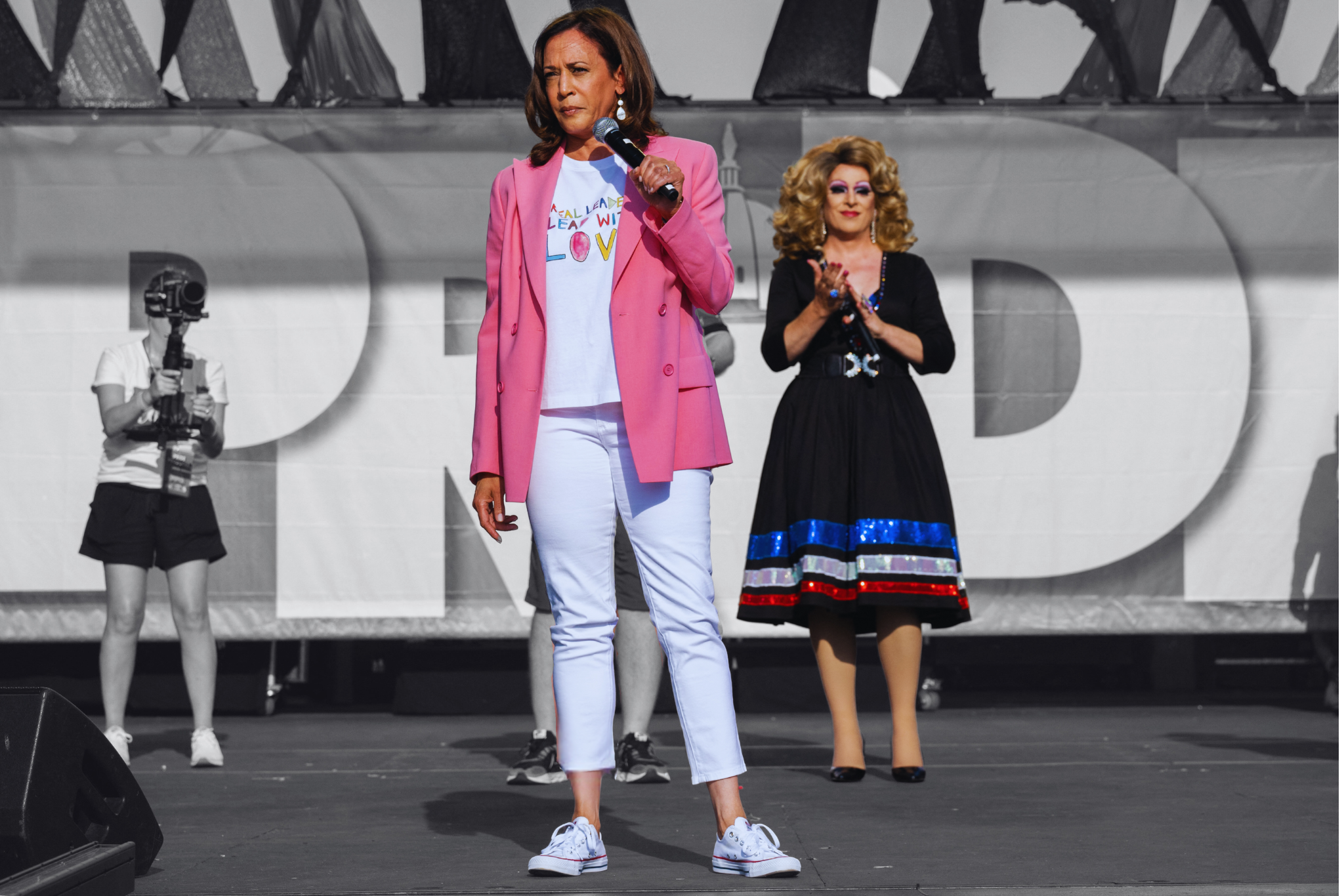Politics is about changing the world. To change the world, you need power so you can implement the policies you think will help people. And to win power, you need to be able to get votes.
All this is fairly obvious, but we live in a political era where obvious and true things bear repeating. So allow me to state the obvious once more: To win votes, you can’t have wildly different views from the public. That’s a lesson Democrats seem to have forgotten.
In the wake of their 2024 loss, a significant portion of Democratic leadership seems to believe that what the party really needs is to change the messaging. They need more aggressive PR, better catchphrases, more viral stunts. They need to go on more podcasts!
Better PR and messaging strategy would help. But the core thing that held Democrats back in 2024 wasn’t PR strategy. It was the party’s beliefs and policies. If Democrats want to win the kind of large and durable majorities that will allow them to really govern, they’re going to have to rethink those policies.
What has the Democratic Party been up to since losing the 2024 election? They’ve been focused on revamping their public image and messaging strategy.
In early February, party insiders elected gun control activist and progressive gadfly David Hogg as vice chair of the DNC. The 24-year-old’s campaign, when it wasn’t busy with pillow-related ventures, centered on the need for “better outreach” and more combative messaging. And during President Donald Trump’s address to Congress on March 4, Democrats decided it would be a great idea to look like huge dorks by holding up homemade signs that said things like “Musk Steals” and color-coordinating pink and white outfits. One member yelled at Trump and was ejected.
Meanwhile, Sen. Bernie Sanders of Vermont and Rep. Alexandria Ocasio-Cortez of New York have been on a tour to “Fight Oligarchy.” Bernie’s always had the ability to draw large crowds, but the rallies offer little beyond repeating the same talking points about billionaires he’s been using for years.

In the wake of the interminable debate about finding a Democratic Joe Rogan—never mind that Rogan himself used to be exactly that—aspiring Patrick Bateman impersonator Gavin Newsom started a podcast. It’s gone terribly and his net approval is down ten points among Democrats. To give one more on-the-nose example: Here’s a survey I was recently served on Facebook from the Democrats:

Notice anything interesting? There’s a “progressive” option but no “liberal” or “moderate” options. There’s virtually no mention of health care, no mention of Trump’s disastrous tariffs, no mention of building more housing. There’s no caucus for lowering the cost of living or for boosting economic growth. But at least we got “AANHPI,” an identifier no Asian person has ever used in their life. We got “interfaith,” a meaningless slop term for a party too afraid to offend anyone’s religious sensibilities in any way. Disabled Native youth will be covered in triplicate. It’s just a social media poll, but it’s emblematic of how Democrats are still focused on messaging strategies and pleasing internal identity groups that very few Americans actually care about.
Democrats didn’t lose in 2024 because they needed to do more outreach to disadvantaged communities or interest groups. Nor were they a few podcast appearances or viral stunts away from victory. They lost because voters could tell that over the course of several years, the party drifted far out of line with the public on a number of highly salient issues. Democrats became the party of nags, aggressively scolding anyone who didn’t speak the correct woke parlance. Joe Biden presided over a genuine border crisis and a broken asylum system that he was far too slow to address. Movements like Defund the Police and the pro-Palestine campus protests originated from the far left, leaving even moderate Democrats associated with policies that were deeply unpopular with voters. And, in the midst of trying to defend losing cultural positions, the biggest Democratic-run cities and states were often poorly governed, suffering from pervasive homelessness, public disorder, and untenable costs of living.
If you’re of the liberal or progressive persuasion, you don’t have to like this trend to acknowledge that it has electoral repercussions. I’ve spent years highlighting the benefits of increased immigration. I believe immigration has made America stronger and more prosperous throughout its entire history, and that it can continue to do so. But when the public is screaming that border security is an issue, you can’t lecture the problem away. You need to respond to the actual concerns of voters or you’re going to lose.
There’s a role for persuasion in politics, of course. But persuasion takes time. If an issue is 70/30 or 80/20 against your party, you need to moderate your stances until you can make your case and change minds. Remember the obvious points we started with. Politics is about changing the world. To change the world you need power, and to get power you need votes. Democrats, in too many areas, continue to deviate from public opinion—afraid to denounce the 20 end of an 80/20 issue in the polls for fear of offending an interest group.

Democrats do themselves no favors by not loudly condemning the excesses of wokeness, which are real if often exaggerated. They do urban voters no favors when they fail to loudly denounce Defund the Police because progressive activists might get mad at them. They do immigrants no favors when they fail to deal with the border crisis—we’re now in a situation where soccer players with asylum court dates are getting deported to notorious third world prisons with no court hearings or due process. If your immigration stance brought you to this point, of what use was the stance?
That’s not to say Democrats must abandon their liberal values—after all, Trump’s takeover of the GOP has seen Republicans largely abandoning liberalism in favor of lawlessness. But Democrats do need to change. They can get visibly tougher on illegal immigration while still advocating for more legal pathways and the fair treatment of immigrants. They can focus on the LGBT rights that matter like non-discrimination in the workplace, non-discrimination in housing, and access to healthcare—rather than dying on dubious and unpopular niche issues like trans athletes in women’s sports. They can loudly denounce the excesses of DEI (such as mandatory diversity statements for technical STEM research) while preserving diversity and inclusion ideas that still make sense (such as honoring civil rights heroes like Jackie Robinson). They can advocate for intelligent police reforms while still taking a hard stance against public disorder, crime, and anti-social behavior.
And most importantly, Democrats need to come out full throttle against Trump’s disastrous tariffs and promise to repeal them on day one. They need to become a party that actually cares about the cost of living, the housing crisis, and clean energy. If they want voters to trust them, Democrats must show that they can effectively run the cities and states they govern locally.
All these ideas require real policy change. It’s likely to piss off several entrenched interest groups inside the party. Democrats should do it anyway.
The real danger, paradoxically, is that Democrats probably don’t need to do any of this to win in the 2026 midterms. Thermostatic backlash is one of the strongest forces in American politics right now, and Trump’s approval ratings are already cratering. Trump’s administration is breaking things at an astonishing rate, his tariffs are causing chaos and are set to increase the cost of living, and the country may be barreling toward a recession. By 2026 the odds are that MAGA and Trump will be deeply unpopular and Democrats can coast to a midterm victory without having to change much of anything.
But that’s not the path to a durable majority. That’s a recipe for eternally getting 48 to 51 percent of the vote, a path where you flip a coin every four years to see if you got lucky this presidential cycle. Democrats need to aim for something more, and the only way to win larger majorities is to aim at the middle.
Kamala Harris, to her credit, seemed at least partially aware of this. She ran a decent campaign in 2024 that tried to reverse some of the leftward lurch of her party. She rarely emphasized her race or gender and moderated from the more left-leaning stances she took as a Democratic primary candidate in 2020. But three things dragged her down. First, the Democratic Party is often judged not just by what its leaders say but by the actions of activists, influencers, and academics who have collectively veered far to the left. That trend has been decades in the making, and for many voters, their perceptions of the party were already locked in place. Second, Harris’ ill-fated turn as an ultra-progressive in the 2020 primary dampened the credibility of her 2024 turn toward the center. And third, Harris refused to break with Joe Biden. One of the defining moments of the 2024 campaign came when Harris told the ladies of The View that she couldn’t think of a single thing she would have done differently from Biden. It was an act of political malpractice—Biden was deeply unpopular and when offered a chance to distance herself from him, she refused to do so.
Other Democrats are attempting to point in a new direction. Gavin Newsom’s podcast adventures show signs of moderation—he has denounced leftist positions on trans women in sports and tried to find common ground with conservatives. But unfortunately, his method for doing so has been to invite rabid MAGA partisans like Steve Bannon and Charlie Kirk and act like their buddies. That’s not what the furious Democratic base wants—they want someone who will fight Trump with everything they’ve got, not lean into MAGA.
The left wing of the party is more than happy to fight. But they’re still arguing that left-wing policies would be more popular if only we did more activism, or if only we had better messaging strategy. They often claim that by focusing on economic issues, they can duck hard conversations about immigration or culture, aiming for a new politics of evasion. Rather than listen to them, mainstream Democrats need to aggressively moderate. Many of these progressive activists have spent years warning that Trump and the MAGA movement pose a danger to our democracy. The activists are correct on that point, which raises an obvious question: If Trump is so dangerous, why in God’s name have those activists spent the entirety of the Trump era sticking Democrats with hideously unpopular far-left positions?
Democrats can’t evade the public on their unpopular positions by focusing on economic populism, by going on more podcasts, or by having a better ground game. At some point, you need to directly address those positions and break with the past. They need to fight Trump’s illiberal and authoritarian power grabs, but do it while moderating their views. Until Democrats figure that out, they risk being stuck in the political wilderness.

















